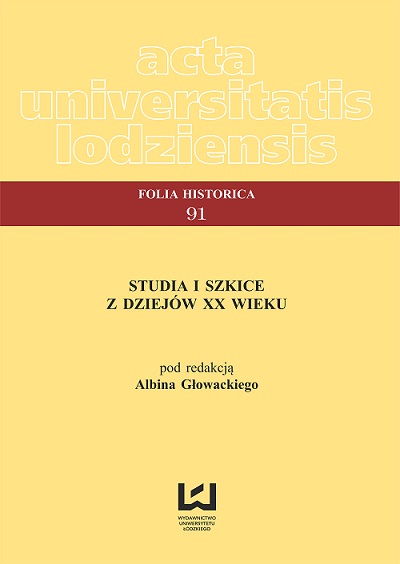General Franco’s Spain in the discourse of communist propaganda as an exemplification of the strategic axioms of the Soviet Union (1944–1946)
DOI:
https://doi.org/10.18778/0208-6050.91.06Abstract
Strategic axioms of The Soviet Union toward Spain crystallized before the end of the World War II. In January 1944 Ivan Maisky said that the Kremlin was interested in „liquidation of the fascist dictatorship of General Franco and the restoration of the republic”. In August 1945 the United States droped atomic bombs on Hiroshima and Nagasaki. In international relation a new factor appered. However, it did not changed the direction of The Kremlin policy. Nuclear weapon only filled the empty blanks in the Soviet strategic calculations. It did also became an important motive of communist propaganda. In February 1946, Stalin gave a speach at the Bolshoi Theatre, which appointed a new course in politics of the Soviet Union. The Host of The Kremlin made it clear that the Soviet Union could become the target of nuclear bombardment. The same day the UN General Assembly issued a resolution that condemned the fascist regime of General Franco.
At the end of the month, France close its border with Spain. Paris put an initiative to bring the Pyrenees’ case to the judgment of the United Nations. Lack of suport of the Anglo-Saxon Powers, however, forced Quai d’Orsay to withdraw from this concept. In March 1946, Poland became involved in the situation of the Iberian Penisula. Next month, Oskar Lange asked the Security Council to consider the situation of the Iberian Penisula. The Polish delegate, implementing strategic axioms of the Soviet Union, argued that the fascist Franco regime threatened international peace and security. He accused Caudillo of producing nuclear weapon and undertaking preparations for the new war. Most of all O. Lange claimed break of diplomatic relations with Spain. Anglo-Saxon powers were not interested in promoting the initiative of Poland. The United States believed that the referral of the General Franco question to the Security Council was a Soviet revenge for Iran case.
In April 29, 1946, the Security Councill, in its resolution, appointed a subcommittee to investigate allagations of Slavic countries. The investigation conducted by the subcommittee revealed that there was no evidence of realizing the nuclear program in Fascist Spain. Allegations of this type, however, were used by followers of the Polish initiative and communist propaganda. On November 4 O. Lange asked to eliminate Gen. Franco’s regime question from the agenda of the Security Council. The problem, however, was transferred to the UN General Assembly. On December 12, there was issued a resolution that condemned the Spanish regime and that recommend United Nations withdrawal of their ambassadors and ministers accredited to the government of General Franco. The resolution stated that the dictatorship of Caudillo is no a threat to international peace and security. There was also said that in Spain there were any works on the construction of an atomic bomb.
The Soviet strategy toward Spain was based on the synergistic axioms. On one hand, USSR wanted to create a base on the Iberian Penisula for the export of Marxist doctrine to Africa and Latin America, and for support of Italian and French communist movement. The creation a democratic republic of new type in Spain would also allow Soviet control of the western Mediterranean. On the other hand, the Soviet Union was about to show the Anglo-Saxon powers in a bad light. Recipients of the comunist propaganda had to belive that the West supported „remnants of fascism”. Scaring with the threat of the new war, which was exaggerated by the atomic bomb factor, served as a justification for restrictions on the inner life in the USSR. It also allowed to mobilize under the aegis of the Soviet Communist Party all country goods – both human and material resources.
Downloads
Downloads
Published
How to Cite
Issue
Section
License

This work is licensed under a Creative Commons Attribution-NonCommercial-NoDerivatives 4.0 International License.











